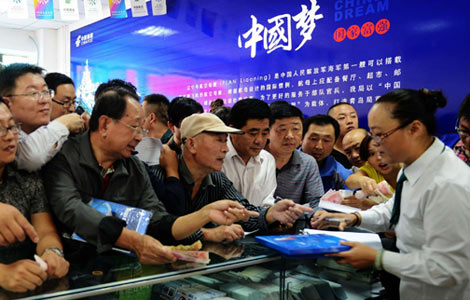New round of speculative fund inflows
Updated: 2013-10-10 00:44
By He Wei in Shanghai and Chen Jia in Bejing (China Daily)
|
||||||||
|
 |
|
Workers conduct railway maintenance work on a Yangtze bridge in Jiujiang, Jiangxi province. The World Bank cut its 2013 China GDP growth forecast on Monday to 7.5 percent from 8.3 percent in April. Hu Guolin / For China Daily |
China is likely to see fresh speculative inflows of money in the short run, while interest rates are set to be pushed higher through the end of the year, fueled by soaring financing demand from the information technology sector, experts said.
That in turn will spark the movement of cash into the nation, according to a study by researchers at Fudan University.
Sixty domestic bankers, brokers and economists were asked for their economic outlooks for the rest of 2013.
More than 70 percent of those surveyed said that China's foreign-exchange reserves will rise over the next 12 months. For the same period, 88 percent foresee a rise in imports, while just 46 percent see export growth.
Sixty-five percent of the respondents expect China to attract more foreign direct investment, in contrast to 83 percent who forecast a jump in capital outflows.
"These seemingly controversial forecasts suggest that the foreign-exchange reserve expansion can only result from the influx of ‘hot money' instead of longer-term investment," said Sun Lijian, director of the Financial Research Center at Fudan and lead researcher of the report.
Sun said such funds are most likely to move into the equity, currency and commodity markets. However, those fund flows will have a limited impact on inflation, which the survey results said would stabilize at 3.13 percent for the rest of the year.
Financial institutions, including banks, securities houses and financial leasing firms, are poised to benefit the most from higher interest rates, Sun noted, while prospects for traditional manufacturers would be clouded by soaring financing costs, further squeezing margins.
The survey results lend credence to the findings of the official Purchasing Managers' Index for September, which rose to 51.1 but was below market expectations. The PMI indicated that China's manufacturing sector, especially State-owned enterprises, had started to expand at a slower pace.
Even though advanced economies are recovering from the worst recession in generations, the pace has been slow and political turmoil in Washington has muddied the outlook.
As a result, the World Bank cut its 2013 China GDP growth forecast on Monday to 7.5 percent, down from 8.3 percent in April.
The International Monetary Fund followed suit, cutting the GDP forecast to 7.6 percent, 0.2 of a percentage point lower than the July reading. Growth is seen at 7.3 percent in 2014, down from 7.7 percent three months ago.
The IMF warned that Chinese economic growth could "slow considerably" if the government fails to step up efforts to "rebalance the economy toward consumption" and reduce the country's excessive reliance on exports and State-backed investment.
But domestic economists displayed more optimism, with the State Information Center forecasting on Tuesday that China can achieve its growth target amid moderate inflation and stable employment.
Economic development will be modest and stable in the fourth quarter with a GDP increase of 7.6 percent, the government think tank said.

 Rare look in Shaolin temple
Rare look in Shaolin temple
 Last photos of Hungarian wingsuit diver
Last photos of Hungarian wingsuit diver
 In photos: Typhoon Fitow aftermath
In photos: Typhoon Fitow aftermath
 Japan-US military drill raises tension
Japan-US military drill raises tension
 Higgs and Englert win physics Nobel prize
Higgs and Englert win physics Nobel prize In Bali, they relax in local fashions
In Bali, they relax in local fashions
 Post office for Liaoning carrier opens
Post office for Liaoning carrier opens
 A smog-filled Beijing targets polluting cars
A smog-filled Beijing targets polluting cars
Most Viewed
Editor's Picks

|

|

|

|

|

|
Today's Top News
China hits at NASA's conference ban
Bo Xilai to appeal life sentence
Japanese war stance concerns diplomats
Yellen 'to maintain continuity' at US Fed
China predicted to be largest tourist market for US
Peace is in China's DNA: says ambassador
Xiaomi's Barra ready to take on Beijing
A day of cultural exchange at Pace University
US Weekly

|

|







